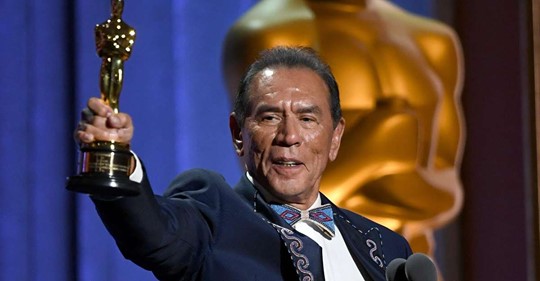
- Details
- By Native News Online Staff
NEW YORK — Wes Studi (Cherokee) was named on Sunday to The New York Times’ prestigious “25 Greatest Actors of the 21st Century (So Far)” list.
Studi comes in at Number 19 on the list. The Times writes about the award-winning actor:
“Wes Studi has one of the screen’s most arresting faces — jutting and creased and anchored with the kind of penetrating eyes that insist you match their gaze. Lesser directors like to use his face as a blunt symbol of the Native American experience, as a mask of nobility, of suffering, of pain that’s unknowable only because no one has asked the man wearing it. In the right movie, though, Studi doesn’t just play with a character’s facade; he peels its layers. A master of expressive opacity, he shows you the mask and what lies beneath, both the thinking and the feeling.” Click here to continue reading the article.
Studi, who grew up in Tahlequah, Okla., is known for his portrayal of Native Americans in a way that forever shattered age-old stereotypes in the movie industry. Breaking new ground, he brought fully developed Native American characters to the screen, and then took it a step further by highlighting the success of Native Americans in non-traditional roles.
Throughout his 30-plus-year career he’s won numerous awards, including several First Americans in the Arts awards and the 2009 Santa Fe Film Festival Lifetime Achievement Award.
In October 2019, Studi became the first American Indian actor to receive an Academy Honorary Award at the annual Governors Awards in Los Angeles.
“I’d simply like to say, it’s about time,” Studi said upon receiving the Oscar. “It’s been a wild and wonderful ride, and I’m really proud to be here tonight as the first Indigenous Native American to receive an Academy Award. It’s a humbling honour to receive an award for something I love to do.”
He became only the second Indigenous person ever to receive an Oscar. Singer/songwriter Buffy Sainte-Marie shared an Oscar for best original song for “Up Where We Belong” for 1982’s “An Officer and a Gentleman”.
In February 2018, Studi, a Vietnam vet, was invited to present at the 90th Academy Awards, where he introduced a video montage of military movies as a tribute to U.S. veterans. He is a passionate advocate for American Indian issues and a leader in promoting and preserving Indigenous languages.
Studi’s credits include 1990’s “Dances with Wolves,” 1992’s “The Last of the Mohicans,” 1993’s “Geronimo: An American Legend,” 2005’s “The New World,” 2009’s “Avatar” and 2017’s “Hostiles.”
More Stories Like This
Watermark Art Center to Host “Minwaajimowinan — Good Stories” ExhibitionMuseums Alaska Awards More Than $200,000 to 12 Cultural Organizations Statewide
Zuni Youth Enrichment Project Takes Top Emerging Artist Apprentices to Phoenix for Artistic Exploration and Cultural Immersion
From Dishwasher to Award-Winning Chef: Laguna Pueblo's Josh Aragon Serves Up Albuquerque's Best Green Chile Stew
Rob Reiner's Final Work as Producer Appears to Address MMIP Crisis
Help us defend tribal sovereignty.
At Native News Online, our mission is rooted in telling the stories that strengthen sovereignty and uplift Indigenous voices — not just at year’s end, but every single day.
Because of your generosity last year, we were able to keep our reporters on the ground in tribal communities, at national gatherings and in the halls of Congress — covering the issues that matter most to Indian Country: sovereignty, culture, education, health and economic opportunity.
That support sustained us through a tough year in 2025. Now, as we look to the year ahead, we need your help right now to ensure warrior journalism remains strong — reporting that defends tribal sovereignty, amplifies Native truth, and holds power accountable.
 The stakes couldn't be higher. Your support keeps Native voices heard, Native stories told and Native sovereignty defended.
The stakes couldn't be higher. Your support keeps Native voices heard, Native stories told and Native sovereignty defended.
Stand with Warrior Journalism today.
Levi Rickert (Potawatomi), Editor & Publisher

